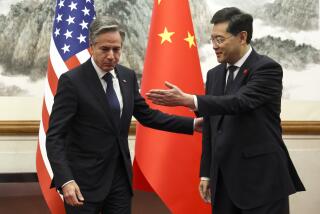Reporter’s Notebook : Soviets Turn Into Back-Slappers; U.S. Sees ‘Propaganda Game’
- Share via
HELSINKI, Finland — The Soviet Union and its new, affable foreign minister, Eduard A. Shevardnadze, have been keeping an unusually high profile at meetings on the 10th anniversary of the Helsinki accords.
In sharp contrast to the typical taciturn manner shown by Soviet officials at past international conferences, the Soviet delegates have turned into virtual chatterboxes.
The flow of words--described as a “propaganda game” by one senior American official--appears related to the peace offensive proclaimed from Moscow by new Soviet leader Mikhail S. Gorbachev.
Shevardnadze, full of smiles for the hordes of photographers who have dogged his steps here, showed restraint in rhetoric in his address to the conference without toning down Soviet criticism of the United States.
Foreign Ministry spokesman Vladimir B. Lomeiko, who only last week was accusing American human rights proponents of promoting vice, today was joking and back-slapping with his U.S. counterpart, State Department spokesman Bernard Kalb. Lomeiko also made himself available in the press lounge, even employing his rudimentary English at times to communicate with correspondents.
The Soviets scheduled a news briefing--nearly unheard of at such international meetings--right after Shevardnadze’s address, drawing many of the reporters away from the hall while Secretary of State George P. Shultz was accusing the Soviet Union of human rights violations.
Lomeiko, Geneva arms control negotiator Yuli A. Kvitsinsky and Deputy Foreign Minister Viktor G. Komplektov outlined Soviet positions for nearly an hour. They turned aside questions on human rights, simply refusing to discuss the issue, but avoided the angry blowups that usually occur when Western reporters raise such matters in Moscow.
Later, Avital Shcharansky, wife of Anatoly Shcharansky, one of the prisoners mentioned by Shultz as a victim of Soviet injustice, complained that Shevardnadze was trying to project a false image of “moderation and modernity.”
Anatoly F. Dobrynin, the Soviet ambassador to Washington, who was reported to be on the skids by some U.S. newspapers, was at Shevardnadze’s side almost constantly during the Helsinki sessions. Dobrynin, with nearly three decades of experience of working with Americans, seemed to be the indispensable aide at the meeting.
Meanwhile, Shultz walked nearly the length of the hall to greet Shevardnadze before the first session began. Dobrynin served as interpreter for the impromptu encounter. A senior American official said later that Shultz took the initiative to tell the new Soviet foreign minister that he looked forward to a three-hour discussion today. On his behalf, Shevardnadze sent greetings to President Reagan from himself and Gorbachev.
First reactions to Shevardnadze by other diplomats seemed to be favorable by comparison with his predecessor, Andrei A. Gromyko, often called “Grim Grom” by his fellow foreign ministers.
An American diplomat said of Shevardnadze, “He’s very relaxed.”
Another Western diplomat added: “He’s casual, he speaks without notes and there’s a lot of give and take when you meet him. It’s incredible to find that the foreign minister of the Soviet Union really listens to you.”
Reporters established an informal “Shevy watch” over the new Soviet diplomat. “He has already smiled more than Gromyko did in 20 years,” said one experienced diplomatic correspondent.
One reporter even noticed an American Chevrolet in the Soviet motorcade but, alas, Sheverdnadze did not ride in that car, spoiling potential puns about a “Shevy Chevy.”
More to Read
Sign up for Essential California
The most important California stories and recommendations in your inbox every morning.
You may occasionally receive promotional content from the Los Angeles Times.










